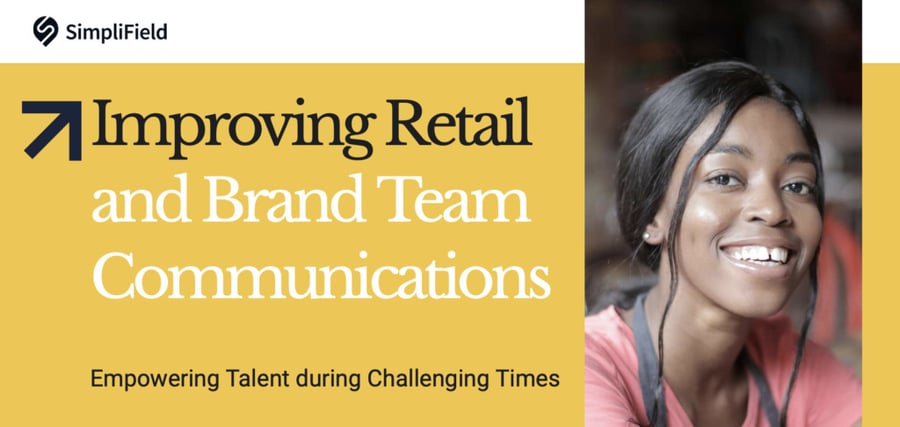The What, Why and How of Employee Empowerment in Retail


Employee empowerment (or talent empowerment) is trending. Yet, when it comes to defining what employee empowerment is, things remain pretty fuzzy.
At SimpliField, we are big advocates of talent empowerment. Our mission itself revolves around bringing a solution to empower and unleash the potential of retail teams, and helping them do the best work of their lives. But we quickly came to realize that this term does not translate as perfectly as we would like (especially in French).
So what does employee empowerment really mean for retailers today?
In one of our latest webinars, we brought together Dr. Soni Basi, Head of Talent Management and Acquisition at AIG (formerly VP of Talent at Allergan and Estée Lauder), Patrick Kulesa, Global Research Director at Risk and Human Capital consulting firm Willis Towers Watson, and SimpliField CMO Richard Sharp for a discussion on talent empowerment during difficult times.
From what does employee empowerment mean, to why you need it, and how you can get started today: here are 3 things you need to know to empower your talent and thrive amidst these unprecedented times.
Employee Empowerment Is Unleashing The Potential of your Talent
According to Dr. Soni Basi, “The word empowerment is being able to unleash potential in your people. And once you're able to unleash potential, you can just see the way in which people shine so much brighter than if you micromanage, if you're not in touch with who they are as individuals, and if you're not able to give them the type of work that they really value."
Basi added, "I know that you can't always give people exactly what they want. But I know that having done this work for my entire career, you can always find nuggets that people love to do.”
Patrick Kulesa also complemented the definition:
“The field evolved over the years. I have talked about employee satisfaction, employee commitment, employee engagement and empowerment. And now we talk about things like employee experience. But the core of it has always been giving people a voice, and helping improve organizations based on what their people identify as challenges and opportunities every day".
With anxiety levels at their peak amidst the pandemic, providing employees with meaningful and fulfilling jobs will reassure and motivate them to come to work and do their best.

Why Retail Relies On Talent More Than Ever
In times of crisis, talent empowerment may not sound like a priority concern. However, retailers actually depend more than ever on their teams to outperform: retail employees are overburdened with work, having to deal with both new health and safety regulations and keeping excellent customer service to meet sales targets. Not only are employees required to do more with less, but a Willis Towers Watson survey also revealed that 83% are facing high levels of anxiety as a result of the pandemic.
In order to thrive in this new retail world, managers cannot give up on their employees.
“A lot of retailers and brands (and a lot of businesses in general) are in a lot of trouble in the midst of this pandemic, and in order to get out of this mess, we're going to need talent. We're going to need to empower our people with the tools that they need, with the investment that they need, with the care and well-being that they need to help us build these new visions for the future. We should be investing in things like retraining, helping people, obviously technology, giving them the tools that they need to do their job better," said Richard Sharp.
Plus, to retain talent, managers must meet employee expectations by giving meaning and purpose to their jobs: “The needs and expectations of employees have changed. Employees are not robots. They're human beings that want to be given the tools, relationships and connections they need to reach their potential. They are also looking for the ability to feedback on how to improve, and how to impact the world around them, as opposed to repetition, stagnation and a top-down, task-driven approach to doing their job," he added.
Leveraging Diversity Is Key For Employee Empowerment
Although the Willis Towers Watson survey shows that employees are celebrating better managerial practices aimed at improving well-being during the pandemic, Patrick Kulesa pointed out that, “When you get into some of these other topics, especially how you leverage diverse teams to really focus on work and execution, the story is not quite as rosy.”
Basi reiterated the absolute necessity to not overlook the importance of diversity and inclusion - especially at this point in time.
She identified 3 key areas to address employee diversity, inclusion and belonging.
“The way I think about it is that diversity is ‘now I'm in the organization’. Inclusion would be that ‘I get invited to the right meetings’. But belonging would be when ‘I'm in that meeting’, ‘I feel like I can speak up, contribute’, and ‘I feel like my opinion matters in that meeting without any fear’. [...] You need all three of them to be there. And I would say equity goes across those three. If you don't have an equitable organization, regardless of what you try to do on the other three, you're going to come up short.”

In order to address these, Kulesa highlighted that there is strong potential in gathering employee feedback to identify those specific pain points. This is particularly true considering that the specific segments coming through the survey results are women and ethnic minorities in middle career bands, which both come with their unique issues: “There is tremendous diversity around diversity needs today, and companies are really mining their data and getting that feedback in soft and hard ways to find those pockets and really help support them. It really is critical to find where your challenges are and understand the actions to take you there.”, he said.
Those companies pursuing improved diversity and inclusion face additional challenges today around remote working and required distancing, but Basi believes that these new communication methods can also be a strength:“When you're all on Zoom, it's actually so beautiful because you're seeing everyone's faces. You can see who hasn't spoken up in a while in a way that you couldn't necessarily in the boardroom. You don't speak over one another. So there's already a level of respect that's starting to come up, and if you're a manager, it's really up to you to make sure that people feel seen and heard, that they feel important and valued.”
The Takeaway
By truly understanding what employee empowerment entails, from providing the right tools to giving your employees a voice, your teams will be more motivated and performant than ever. In these unprecedented times, management isn’t only about cutting costs and increasing efficiency, but also simply about being more human. Such efforts will resonate all the way down to your customers and help you reach those business goals despite challenges brought by the pandemic.
To dig deeper into employee empowerment in retail, watch the webinar replay here.


Need help building connections with your team, providing clear and transparent leadership, and rebuilding your communications to get real-time feedback from the ground up? Contact SimpliField today.
Contents
Subscribe to Retail Tomorrow
Get our latest insights and analysis about innovation and retail



